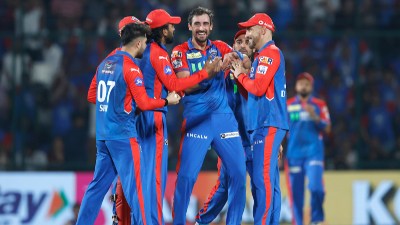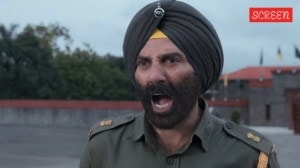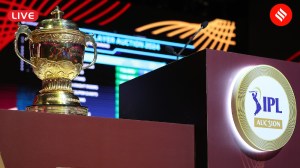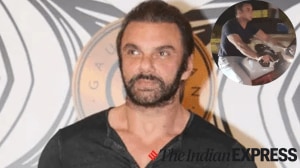Underachieving NCP under Sharad Pawar? Ajit question haunts both camps amid war of attrition
At an NCP event last month, Ajit Pawar told rank and file how the party could never form a govt in Maharashtra on its own steam despite having leadership of the ‘tallest’ regional leader
 With Ajit’s recent bid to split the NCP after weaning away an apparent majority of party leaders and legislators to his camp, Sharad Pawar faces an uphold task to retain his grip on the party as he embarks on a state-wide tour in a major public outreach in order to rebuild it. (Express archives)
With Ajit’s recent bid to split the NCP after weaning away an apparent majority of party leaders and legislators to his camp, Sharad Pawar faces an uphold task to retain his grip on the party as he embarks on a state-wide tour in a major public outreach in order to rebuild it. (Express archives) In the midst of the Nationalist Congress Party (NCP)’s current upheaval, both the warring NCP groups — led by party president Sharad Pawar and rebel leader and nephew Ajit Pawar — are believed to be grappling with the question why the party could never fulfil its goal of winning a majority in the 288-member Maharashtra Assembly since its inception in 1999.
With the NCP’s best-ever tally in the Assembly polls standing at just 71 seats so far, the magic figure of 145, which marks the simple majority figure, has remained a distant dream for the party.
Sources in the Sharad Pawar camp said: “The main reason for our underperformance has been the fact that the NCP and its parent party Congress have shared the same vote bank. Though they are separate parties they have common ideology and policies.”
Sources said the NCP never pursued the role of an aggressive Opposition against the other major players in the state, including the Bharatiya Janata Party (BJP), Shiv Sena and Congress. “We always supported development politics. Pawar Saheb was chairman of disaster management committee during Atal Behari Vajpayee government after the Gujarat earthquake. He shared the dais with Prime Minister Narendra Modi at the agriculture convention held at Baramati,” said a senior party leader, who requested anonymity.
So politics never came, he said, in the way of making development a common objective. “But in public perception it could be misunderstood as a compromise,” he admitted.
With Ajit’s recent bid to split the NCP after weaning away an apparent majority of party leaders and legislators to his camp — and join the Eknath Shinde Sena-BJP government as the Deputy Chief Minister along with eight senior MLAs — Pawar faces an uphold task to retain his grip on the party as he embarks on a state-wide tour in a major public outreach in order to rebuild it.
At an NCP event in Mumbai on June 21, Ajit had told the party leaders and workers how the party could never form a government in the state on its own steam despite Pawar’s leadership.
”In West Bengal Trinamool Congress (TMC) led by CM Mamata Banerjee has been successful in winning absolute majority and forming her party’s governments. In Tamil Nadu late J Jayalalitha had achieved the feat. In Andhra Pradesh Chandrababu Naidu led his party to win the majority and form governments. Similar success was achieved by BRS chief K Chandrashekhar Rao in Telengana and BSP president Mayawati in Uttar Pradesh, among other regional leaders,” Ajit had then said. “Among all these leaders Sharad Pawar is the tallest leader. Yet, NCP failed to ever get majority on its own,” he rued.
Nobody within the NCP has ever dared to flag this “bitter truth” earlier as any such attempt would have meant raising a question mark on Pawar’s leadership of the party that he founded after breaking away from the Congress along with senior leaders, Tariq Anwar and P A Sangma, 24 years ago. When Ajit raised this point many in the party wondered about his intentions, even as he sought to project it as the organisation’s collective failure rather than putting the blame at his uncle’s doorstep.
In the September 1999 Lok Sabha polls, when the Congress and NCP fought separately against the alliance of the Shiv Sena and BJP, out of the state’s total 48 seats the Congress and NCP won 10 seats and 6 seats respectively, while the Sena and BJP bagged 15 seats and 13 seats respectively.
In the subsequent elections, when it fought as part of an alliance with the Congress, the NCP won 9 seats — its best-ever tally — in 2004, 8 in 2009, 4 in 2014, and 4 in 2019.
Although over the years the NCP has tried to spread its wings in various states, including Gujarat, Goa, Kerala and Meghalaya, it has merely been a token attempt, as the party’s key power base has always remained Maharashtra.
In the 1999 Assembly polls, the NCP secured 58 seats, with the Congress managing to win 75 seats despite Pawar’s exit. The Congress-NCP’s post-poll alliance saw Vilasrao Deshmukh becoming the CM. In the subsequent Assembly polls, both parties contested as allies, with the NCP winning 71 seats in 2004 and 62 seats in 2009.
In the wake of Narendra Modi’s rise in the 2014 general elections, the Assembly polls in Maharashtra that year saw all four major parties — the Congress, NCP, Sena and BJP — contesting separately, with the NCP’s tally plunging to 41 seats. The BJP emerged as the single largest party with 122 seats, with the party’s Devendra Fadnavis becoming its first CM in the state.
The 2019 Assembly polls, however, saw face-off between the BJP-Sena and Congress-NCP alliances, with the BJP and Sena winning 105 seats and 56 seats respectively and the Congress and NCP’s tallies being 54 and 44 respectively.
In this backdrop, a split in the NCP with both the Pawar and Ajit factions battling for control of the party may further weaken the party and damage its prospects in the coming elections.
- 01
- 02
- 03
- 04
- 05































